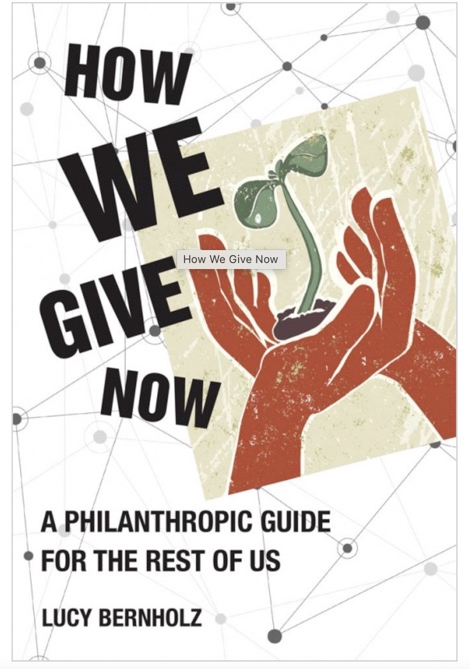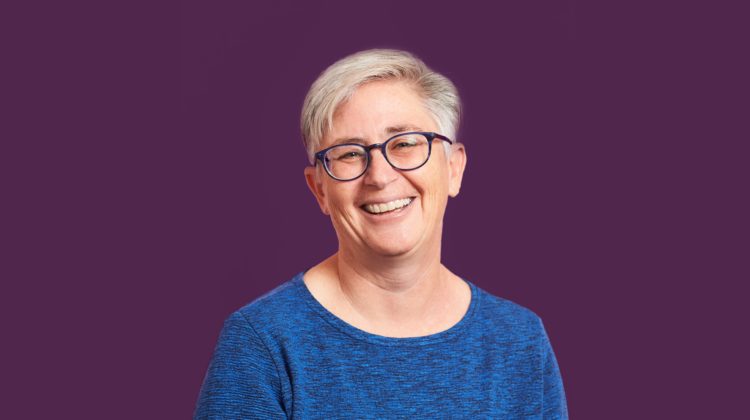by Gail Picco, October 14, 2021

How we give now: A philanthropic guide for the rest of us, Lucy Bernholz, The MIT Press, October 12, 2021, 240 pp., $31.99
Dr. Lucy Bernholz has written the most important book on philanthropy this year.
Bernholz, Senior Research Scholar and Director of the Digital Civil Society Lab at Stanford University, conducted research for the book on what she calls the givingscape to discover that giving money—a modern definition of philanthropy—misses a large swath of what people are doing to make the world a better place. Her simple question “how do you give?” provides a flurry of answers that shakes our transactional definition of philanthropy to its core.
For the past 12 years, Lucy Bernholz has been the force behind the annual Philanthropy and Digital Civil Society Blueprint monograph series, and she’s closely observed the changing dynamics in the nonprofit sector.
She defines the givingscape as a collection of “the products and tools we use to give, from the rise of the donor-advised funds to crowdfunding platforms; from products affiliated with certain cause to the creation of new types of organizations for bundling political donations.”
“By focusing on products, I mean to highlight the commodification of giving to refute claims that what is going on is somehow democratizing. The former is about selling more things to more people, the latter is about sharing power.”
To answer the question of how, exactly, regular people give, she and her team surveyed more than 2,200 people and held 33 “mapping conversations” with a diversity of participants. The mapping of conversations plots them on a graph that’s created according to pre-identified themes. By plotting responses, patterns can be revealed.
And while the book has a sturdy conceptual framework, it’s full of fresh and inspiring stories about how people are contributing to the world around them by engaging in demonstrations, helping children cross the street, investing in progressive developments or supporting political candidates they believe will help make the systemic change. We meet Rashad Robinson from Colour of Change, Nick Tilsen from Pine Ridge Reservation, and Margarita Mina from Safe Passage in San Francisco.
Mina is one of about two dozen volunteers with Safe Passage, a group of volunteers who fan out in intersections wearing walkie-talkies and sport bright vests, carrying signs that escort small children through San Francisco’s Tenderloin district to ensure their safe passage home. According to a local radio station, “The Tenderloin area is known for the homelessness on its streets and open drug use and sales. But it is also one of the few affordable neighborhoods left in one of the most expensive cities in the nation and is home to hundreds of low-income and immigrant families.” According to a local radio station, “The Tenderloin area is known for the homelessness on its streets and open drug use and sales. But it is also one of the few affordable neighborhoods left in one of the most expensive cities in the nation and is home to hundreds of low-income and immigrant families.”

Lucy Berholtz calls these actions the “power and vibrancy” of practices that aren’t currently recognized by philanthropy.
I felt inspired by reading how people make their neighbourhoods work instead of being depressed by reading about the exponential growth of donor advised funds.
She also dives into the turbulent waters of the personal data being scooped up by the devices we all use and tackles the giving of data as a philanthropic act. You can become a citizen scientist by joining an organized group like Birds Canada, where, two times a year, data is collected from observations made by individual citizen scientist birders, which is then compiled to identify significant bird population changes. Health data can also be shared in a more democratic way, she suggests by availing yourself of the opportunities to keep track of your own health data for research. As it is now, she says, if you go through a DNA sampling firm such as 23&Me, “you’ve paid the company in both money and data.”
Bernholz suggests “contributing through nonprofit genetics websites or other online health communities, such as Open Humans, which offers people a way to store, analyze and share with others their genomic data, their Twitter feeds, movement information from any form of digital exercised tracker, or microbiome measures.”
All this is valuable and thought provoking, but Lucy Bernholz’s biggest contribution with this book is the demonstration of how much generosity is happening outside the transaction of writing a cheque to a charity, and how much oxygen is taken up in the charity sector by this narrow framework. The linear definition has a problematic history, she says, and reflects the commodification of giving that has been going one since “Carnegie and Rockefeller were sold on the concept by a lawyer.”
To people involved in philanthropy at any level, this book will give you a sense of the potential down the road, instead of the fear inside so many of our hearts right now.
More reviews by Gail Picco
Fred Sasakamoose: Call Me Indian October 12, 2021
#BlackinSchool: How school reinforces racism September 12, 2021
Likeness by David Macfarlane: A father’s thoughts of a future without his son July 26, 2021
Sylvia Olsen Unravelling Canada: Pulling at the stitches of Canadian history June 22, 2021
A Girl Called Echo: A Resounding Messenger of Métis History May 10, 2021
David Love: Thoughts of an Environmental Fundraiser April 30, 2021